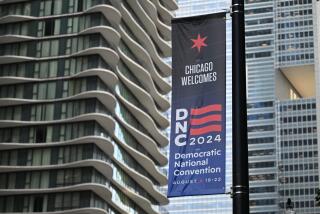China Kicks Off Its Party Congress
- Share via
BEIJING — BEIJING -- President Jiang Zemin, making what many expect to be his final speech as party chief, called on the Chinese Communist Party today to keep in step with the times and to welcome its once-hated class enemies, entrepreneurs, into the fold.
In a country where the private sector now accounts for more than a third of the economy, Jiang acknowledged the need to “bring new forces to the great cause” of rejuvenating China, including the self-employed and private-business owners.
“We should unite with the people of all social strata who help to make the motherland prosperous and strong,” he said this morning at the opening session of a weeklong national party congress.
At the close of the conclave, Jiang, 76, is expected to hand over the reins as party leader to Vice President Hu Jintao, 59. Other senior officials also are expected to retire in what would be the smoothest transfer of power in the People’s Republic, one not precipitated or marred by death, illness or political upheaval.
Addressing the 2,114 delegates who assembled in Beijing’s cavernous Great Hall of the People, Jiang used the opportunity to praise China’s progress under his 13-year tenure and to promote his effort to broaden party membership.
In essence, he asked the delegates to help change the Communist Party’s stripes by approving his theory of the “Three Represents,” a fuzzy formula that allows the party to co-opt members of China’s growing social and economic elite, such as entrepreneurs, who were once reviled as “exploiters.”
The congress is expected to write the “Three Represents” into the party charter next week, enshrining Jiang’s ideas alongside Marxism, Maoism and “Deng Xiaoping Theory” as a guiding principle for China’s development in the new century.
In classic Communist Chinese style, Jiang sought to portray his innovations as somehow an extension of Marxism, not what seems so obviously a repudiation of it.
“The world is changing,” he said. “We must adapt ourselves ... [and] conscientiously free our minds from the shackles of outdated notions, practices and systems, from the erroneous and dogmatic interpretations of Marxism.”
As he delivered his 90-minute speech, Jiang was surrounded by the trappings of communism: billowing red flags, a huge hammer and sickle, greetings of “comrade.”
But the economic vision and policies he outlined, including a call for greater protection of private property, could hardly sound more different from what the party’s founders envisioned when they convened their first congress in Shanghai in 1921.
The world’s most populous nation is now a country full of private companies, crooked officials, stock markets, skyscrapers and unemployed workers and farmers. The dream of an egalitarian utopia led by the peasantry and the proletariat has been replaced by the reality of unequal wealth, concentrated in the cities and slow to reach the countryside.
Jiang acknowledged that uneven development and the growing disparity between the haves and the have-nots are pressing problems the party must address.
He also spoke of the need for clean government in a system riddled with corruption, which has threatened the party’s legitimacy as the sole ruler of China.
But there was no suggestion that the party would tolerate any challenges to its monopoly on power.
In spite of China’s sweeping economic reforms, its Leninist political structure remains stuck in time, with little hint of anything beyond limited internal party reforms.
“We should never copy any models of the political systems of the West,” Jiang declared.
Indeed, before the congress opened, in a city awash in red banners and tight security, Chinese police detained political dissidents to ensure that nothing blemished the shiny image of unity the Beijing regime wants to project.
Whatever unity there is owes in large part to Jiang’s astute political maneuvering since he was plucked out of relative obscurity by Deng to lead China in 1989, after the tumult of the Tiananmen Square massacre.
Jiang defied predictions that he would be a temporary figure by engineering the downfall of rivals and promoting his cronies.
When the party’s ruling body, the Politburo, is unveiled next week, its newly constituted ranks are expected to include many of Jiang’s proteges, through whom he can wield influence even after his formal retirement.
His speech, which was broadcast live on national television, was also a political victory. It had to be vetted by the Politburo’s all-powerful seven-member Standing Committee, which includes rivals such as hard-liner Li Peng, but Jiang was able to get it through with all the praise it lavished on his tenure and his personal theory of the “Three Represents.”
The congress is the party’s 16th national gathering since it was founded 81 years ago. Then, there were only about 60 Communists in all of China, and the 13 delegates to the first congress assembled illegally, meeting at a girls school and then on a lakeside boat to avoid discovery.
Other congresses have also proved historic in Communist Chinese history. In 1945, at the seventh conclave, Mao Tse-tung emerged the undisputed leader of the party -- the beginning of 31 disastrous years of rule, including such misguided campaigns as the Great Leap Forward and the Cultural Revolution.
In 1982, at the 12th party congress, Deng, by then China’s “paramount leader,” proposed developing “socialism with Chinese characteristics,” his code phrase for capitalism. His market-oriented reforms were later written into the party charter as “Deng Xiaoping Theory” at the most recent party congress, the 15th, in 1997.
More to Read
Sign up for Essential California
The most important California stories and recommendations in your inbox every morning.
You may occasionally receive promotional content from the Los Angeles Times.














